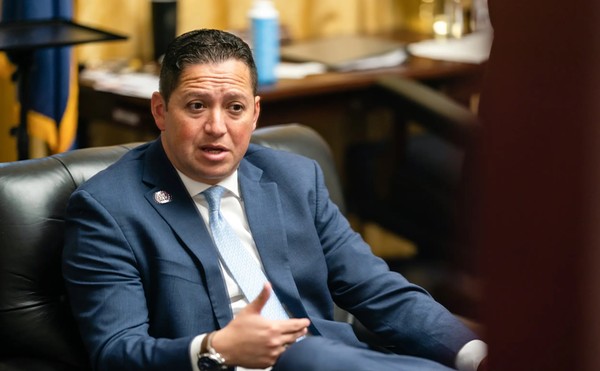The heat, they say, can make you crazy. Maybe that explains recent events at two local arts flagships that invoked City funding to interrupt politically controversial programming.
At San Pedro Playhouse, the final, Independence weekend performances of Among the Sand and Smog — a hardcore play (favorably reviewed by the Current) about the disappearance and murders of the women of Juarez — were canceled, further upsetting cast members already outraged that management had shut down the informal audience talk-backs they were hosting after the show.
Earlier in the run, the cast was informed via a letter from Executive Director Di Ann Sneed, read by the stage manager, that although the original plans for the play’s run had included formal talk-backs, Sneed had decided not to hold them because of difficulties with the production. The cast was also told that City funding prohibited the Playhouse from sponsoring the sort of political discussions the actors had held on their own with audience members the second week of the show’s run.
At around much the same time across town, community literary org Gemini Ink was regretfully declining the services of poet and Native-American activist Margo Tamez, whose name you’ll recognize from the Current’s border-wall series (online at murodelodio.com). “Our executive director has brought it to my attention that we need to be sure we are not making a political statement in this description, as our City-funded contract does not allow us to do so,” Gemini’s Amy Johnson wrote Tamez. Tamez declined to back down from her intent to teach a “poetry of witness, resistance and dissidence against militarization, war, and the wall ...” as she put it in an email to local activists, and the workshop was nixed.
“I wish that we did not have to make decisions based on funding received from the city,” Johnson wrote to Tamez June 19 after she refused to alter her course description further, “but unfortunately that is our position as a non-profit.”
But would such a class, or a politically oriented audience dialogue, cost these groups their substantial City stipends?
Amy Kastely, lead attorney for the plaintiffs in Esperanza v. City of San Antonio, Esperanza’s successful suit against the councilmembers who tried to defund the arts organization in the mid-’90s because of its lefty bent, says it’s unlikely.
“That really was what the Esperanza lawsuit was about,” said Kastely. “The City doesn’t have to provide arts funding, but once they decide to, and put procedures in place, they can’t make determinations within that process based on the political viewpoint of the applicants.”
Felix Padrón, executive director of the Office of Cultural Affairs, which administers City arts funds, adds that federal non-profit regs make political campaigning a no-no, but “we don’t put restrictions on content or participate in censorship when it comes to artistic content.”
The IRS regulations on which OCA’s funding guidelines are based are as opaque as most legalese, but the IRS Published Guidelines on Political Campaign Activity make it clear that the government’s restrictions apply to an organization’s actions or communications that advocate on behalf of or against a candidate, which can include legislation that is likely to be or has recently been voted on by a candidate in an upcoming election.
As the IRS makes clear, each case is decided on its merits, but among 21 examples it gives, it discusses a non-profit formed to conduct public forums at which “lectures and debates on social, political, and international matters are presented.” The organization qualifited for exempt status, say the guidelines, because “The presentation of public forums or debates is a recognized method of educating the public.”
Neither the Playhouse nor Gemini called OCA to discuss their concerns, said Padrón, perhaps because funding was a red herring.
Some of the cast of Sand and Smog had already clashed with Playhouse management over pushing back the opening date a week and replacing an unprepared actor. According to actors involved in the play and the Playhouse, members of the cast asked that the play’s original opening date be pushed back one week because a key actor had missed rehearsals and was unprepared — an individual who was cast at the insistence of the Playhouse, say some of the unhappy actors. Key cast members subsequently demanded that that actor be replaced. According to the Playhouse, once the opening date was pushed back, they planned to run the play through July 6. But on the evening of July 2, Sneed sent a brief email to the cast that read in part: “The performances of Among the Sand and Smog scheduled for July 5 and July 6, that were added to the original schedule, are cancelled. The total reservations for the two dates was extremely low.”
But some cast members question Sneed’s explanation.
“I don’t think that was the reason,” said cast member Leonard Favela, one of four actors and crew who signed a July 16 email titled “Our Voices: Gagged by the Dollar.” The email charges that “Subsequent events that had occurred behind stage curtains however suggest that other strenous factors were involved in the decision to cancel the show.”
The timing of emails between Sneed and cast members suggests the appearance of, if not retribution, a breakdown in civil communication: On July 1 at 12:39 p.m. cast member Jorge Sandoval sent an email to Di Ann Sneed expressing unhappiness and anger with her decision to stop the actors’ talk-back sessions, her method of delivering the news, and announcing that before the final performances he would stand outside the Playhouse and invite audience members to meet the cast after the show in adjacent San Pedro Park for a Q&A session. By 5:13 p.m. the next day, following a rash of heated emails between Playhouse staff, Sandoval, and Favela, the remaining shows were canceled.
The emails between cast and staff also reveal a fundamental disagreement over how a theater company should operate. “As to some of your other comments, I did not question the professionalism of the cast. If fact `sic`, I believe I said that as professionals, I expected you all to understand that it was not the cast’s right to decide whether or not post-show discussion `sic` were held,” Sneed wrote July 2 in reply to a letter from cast member Jorge Sandoval. “We have never had a cast issue ultimatums about casting, rehearsals or post-show discussions before — that is just a statement of fact.”
Favela acknowledges that his original theater background is in the Guadalupe’s community theater and the carpa tradition, the populist, Mexican, vaudeville-style traveling performances of the ’20s and ’30s. He’s accustomed, he says, to engaging with the audience after performances.
“I noticed opening weekend that the audiences were left not knowing how to act,” said Favela, so he and other cast members decided to facilitate post-show dialogues themselves. “We facilitated two really good discussions between the audience and us. ... I for one got a lot out of it as an actor.”
After they were initially told not to hold those discussions because it could jeopardize funding, Favela invited audience members to meet the cast outside the theater after the show if they’d like to discuss the play. Sneed nixed that, too, this time in person, which led directly to Sandoval’s email, followed closely by the show’s abrupt end.
In a conversation with the Current that echoed some of her comments in her email to Sandoval, Sneed expressed her disappointment that a play she says she worked hard to find and bring to San Antonio has resulted in bad feelings and negative publicity. “In fact, I went through a great deal of trouble to track down the play and bring it to the Cellar,” said Sneed, who went looking for the script after she read a review of Among the Sand and Smog in The Austin Chronicle, following its premiere at Frontera Fest. “I thought, this sounds so important and good.”
City arts funding seems to have been falsely accused in Gemini Ink’s case, too. For Tamez, art and her viewpoints are inseparable, an idea she defended in an email to Gemini Ink. “I realize that the issues raised by the poor oppressed groups and indigenous of S. Texas — against the militarization and genocide of our people — is ‘political’ for some sectors and even dangerous for some groups to come out and take a position,” she wrote. “... Yet this poetics is exactly what I’ve already spoken in numerous radio and public televion and public speeches throughout the country.”
Tamez’s course description (which you can read below) did specifically talk about “communities negatively impacted by the Texas-Mexico border region” and “creative public discourse to stop the ‘muro de odio,’” but it didn’t mention specific legislation or candidates. (Tamez told the Current via email that she is on the road and isn’t available by phone until Thursday.)
Rosemary Catacalos, the Gemini executive director referred to in Johnson’s email, says Johnson is relatively new to the job and didn’t precisely translate her concern to Tamez, but in any event, the real problem is that Tamez’s course description was too one-sided. “She sent a class description that was literally not an invitation to people who do not think like she does,” said Catacalos. “The issue is not the political stance; the issue is when you have a political stance, make it clear other people can participate as well.”
“The first iteration of her course description, it didn’t mention writing, it mentioned organizing and strategizing,” Catacalos added. “I’m all for that, but not in the context of a poetry workshop.”
_______________________________________________
Tamez’s course description, altered once to add specific references to poetry at Gemini’s request, according to Catacalos. The parts in blue were apparently modified from an earlier version and/or highlighted to draw attention to writing components:
Gemini Ink Course Description
Title: POETRY of Resilience and Resistance: Voices Against the Wall
Level: All
Instructor: Margo Tamez (Lipan Apache, Jumano Apache)
Date: December 5-6, 2008
“Why I speak out? This is our home. My ancestors--my forefathers and foremothers--are buried in these lands since time immemorial. I’ll never consent for a wall to be built here. Not ever.”
--Eloisa García Tamez (Lipan Apache)
This gathering of cultural workers will focus on structuring a poetics influenced by personal experiences, rooted in both passion and dissent, new visions and local strategies engendering what is being spoken and witnessed from communities negatively impacted by the Texas-Mexico bordered region: ‘traditions’ of gender, race, sexual repression and the politics of exclusion. For 1400 miles, multiply-impacted communities argue in creative public discourse to stop the ‘muro de odio’—a poetry of the people in the tradition of older ‘canons’ and literacies of the land. Using film, web-images, You-tubes, blogs, Facebook, Myspace, photographs, archives, and news-stories, participants will support their work to claim important space to voice and to witness.
________________________________________________
Email chronology between Among the Sand and Smog cast and Playhouse staff.
July 1, 2008, 12:39 p.m. Cast member Jorge Sandoval sends San Pedro Playhouse Executive Director Di Ann Sneed an email with a letter attached expressing his unhappiness with her decision and method of communication regarding several aspects of the production, especially her decision to discontinue the cast-run talk-backs after performances. In conclusion, he says he will stand outside the Playhouse before the remaining two performances and invite audience members to join him and other cast members in the park after the show for a Q&A.
July 2, 2008, 4:07 p.m. Sneed replies to Sandoval, telling him that “You were not engaged for any other purpose `than as an actor` nor are you authorized to engage in any other activity while ou are performing at the Playhouse.”
July 2, 2008, 4:18 p.m. Playhouse Artistic Director Frank Latson sends an email addressed to Sandoval and copied to the rest of the cast. It opens with “I am appalled at you and your entire cast for your outrageous behavior in holding talk-backs without either the permission of Di Ann (our boss) or the participation of the Playhouse Staff,” and closes with “WHO DO YOU THINK YOU ARE? I’m ashamed of you. You should all be very ashamed of yourselves.”
July 2, 2008. 5:13 p.m. Sneed sends the cast an email notifying them that the remaining two performances have been canceled, and citing low reservation numbers as the reason.
July 2, 2008, 7:54 p.m. Favela sends Latson a long response calling Sneed “cowardly” and asking Latson how dare he attack the cast in an email forum.
July 16, 2008. A public email petition/letter is circulated about the decision to cancel the two performances and shut down the actor-led talk-backs. According to Sneed, it’s signed by four of 16 cast and crew members.

















